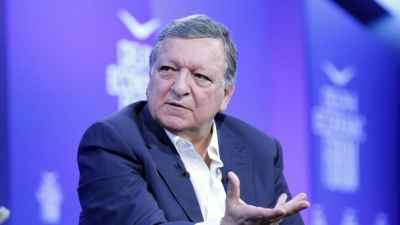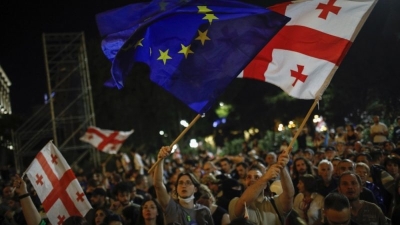France to strengthen national and EU food sovereignty, agriculture minister says
France is preparing to regain its and Europe’s food sovereignty, Agriculture Minister Marc Fesneau told Parliament’s National Defence Committee on Tuesday (5 March), stressing that food has become “a weapon” and the EU must “overcome its naivety”.
“Europe’s collective mistake is to have disarmed the continent” on food sovereignty, while the Americans and even the Chinese have been preparing for a long time, Fesneau told members of the National Assembly’s National Defence and Armed Forces Committee.
Food sovereignty is now at the heart of France’s strategy, the minister said, highlighting the work to be done. This includes reducing dependence on imports in many sectors, such as animal feed – much of which is imported from Brazil – fruit, vegetables and poultry.
According to the minister, global warming, the loss of biodiversity, and the need for generational renewal in agriculture should lead to a French and European strategy being put in place.
Durum wheat and global warming
In this context, Fesneau announced several projects, particularly in the field of fertilisers. Europe’s dependence on Russia for mineral fertilisers is a truly “strategic issue”, the minister stressed. As these fertilisers are largely made from fossil fuels, the aim is to switch from mineral nitrogen to organic nitrogen.
Referring to the growing hostility of local residents to this type of industrial production, he said that “we will have to accept the installation of nitrogen fertiliser plants on our territory”.
During the Salon de l’Agriculture (24 February – 3 March), France also unveiled a plan to boost durum wheat production.
Although it remains Europe’s second largest producer after Italy, France exports a large proportion of its production to the EU and to third countries in the MENA (North Africa and Mediterranean) Region.
Attacked on these exports by deputies from the far-right RN party and the far-left LFI, the minister stressed the dependence of many countries on the EU.
Few countries, apart from the United States, Canada, Russia, and Ukraine, produce this grain, which is the main raw material for making pasta and semolina.
“We have land, a temperate climate and farmers who have been doing it for centuries […] We are capable of producing for other countries,” said the minister, who believes that food sovereignty also means ensuring stable supplies for third countries.
Global warming, he recalled, will increase this dependence on third countries.
“Yields will fall […] There are things that will not grow at 40 degrees”, Fesneau stressed, pointing out that Egypt, for example, cannot meet its population’s cereal needs because of the desertification of its territories.
The French durum wheat plan, worth €43 million over five years, aims to cover 45% of national demand by 2033 (compared with 35% at present). The money is earmarked for research into varieties resistant to climate change – particularly through gene editing – and for efforts to increase France’s market share worldwide.
The Ukrainian question
The Russian-Ukrainian question is a fundamental point in the recovery of sovereignty, the minister insisted.
Russia’s strategy is to “saturate” African markets, which previously depended on Ukrainian cereals, said the French minister, who proposed to facilitate the export of Ukrainian cereals outside the EU as much as possible.
Now that food has become a weapon, the EU must “overcome its naivety”, he added.
It needs a “clear strategy” on Ukraine’s integration into the European Union, for example. Ukraine has a “very competitive agriculture”, with lower production costs and many large farms.
On the one hand, Fesneau said, there was “no question” that farms as large as 40,000 hectares could receive Common Agricultural Policy aid “under the conditions we know today”. On the other hand, Kyiv must be “an ally in the global battle over food”, the minister said.
A strategy of sovereignty also means not allowing products into the EU that do not meet EU standards, either in terms of the environment or agricultural models.
Developing this new approach will not be a short-term endeavour because “regaining sovereignty takes a long time”, concluded Fesneau.

In France, ‘food sovereignty’ is at the heart of a political war
Despite French Prime Minister Gabriel Attal’s intention to incorporate the concept of ‘food sovereignty’ into French law, there remains a strong split over what the concept means, and its compatibility with the government’s trade policy.
Read more with Euractiv




